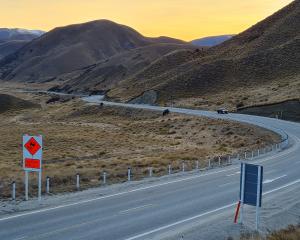Waterline Lowburn Ltd has applied to the Central Otago District Council for land-use consent for two building platforms that breach four planning rules - dwelling separation, minimum yard, maximum height and protruding on to a skyline. The sites are at the intersection of State Highway 6 and the Lowburn Valley Rd.
The council's hearings panel has reserved its decision. Four submissions were received. Lowburn resident Roger de Grauw, the Lowburn Community Action Group and Sugarloaf Cherries Ltd were opposed to the application and Land Information New Zealand took a neutral stance.
Speaking for the applicant, Paterson Pitts director Peter Dymock said the company held four resource consents for the site. Three allowed it to build and operate a restaurant and bar and build apartments, but those consents had not been actioned and would lapse later this year. The fourth consent involved subdivision of land, which was the subject of the application. Mr Dymock said Waterline wanted consent for the building platforms so they could be marketed as residential building sites.
''The submitters appear to be under the mistaken impression that these sites are zoned only for a hotel and travellers' accommodation.''
The scheduled activity of ''hotel and travellers' accommodation'' was overlaid on top of the rural residential zoning of the site. Hotel and travellers' accommodation was a permitted activity but the zoning of the site remained rural residential, which meant there was no ''compulsion'' for an owner to proceed with the option of a hotel or accommodation, he said.
''It would be completely inequitable for council to refuse consent to this application on the ground of some vague community expectation that the sites can only be used for a hotel and travellers' accommodation.''
Panel chairman John Lane said the original intention of the site owner was to provide the community with a hotel to replace the old Lowburn Hotel which was demolished when Lake Dunstan was formed and the area flooded as part of the Clyde dam development. Consents were granted for that activity.
''I have difficulty in seeing two residential units would be more intrusive than what they can do, as of right, there now,'' he said. The Lowburn action group said there was an ''understanding'' the site was zoned for a replacement of the Lowburn Hotel. The proposal would have significant adverse effects on the environment and detract from the amenity values of the Lowburn inlet, spokesman Martin Anderson said. The group has about 45 members. Mr de Grauw said the site was specifically designated for a tavern.
''The applicants purchased a very particular piece of land set aside for a specific use. That they have chosen to do nothing with it is their business, but they should not be rewarded for that inaction by being allowed to carve ever larger holes out of the district plan,'' he said.
The council's planning consultant, David Whitney, recommended the council should grant consent, subject to 18 conditions.












